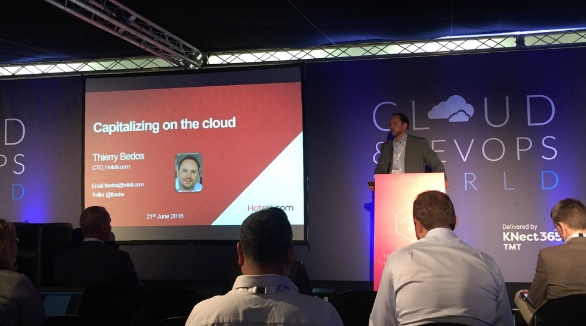Speaking at Cloud and DevOps World, Hotels.com CIO Theirry Bedos outlined some of the cloud industry’s growing trends, including the erosion of AWS’ dominant position.
June 21, 2016

Speaking at Cloud and DevOps World, Hotels.com CIO Theirry Bedos outlined some of the cloud industry’s growing trends, including the erosion of AWS’ dominant position.
The growth of the cloud industry has been well documented over recent months, as numerous studies and surveys dominate web searches claiming adoption rates are accelerating. While it is still debatable if cloud has penetrated the mainstream market, according to Bedos, what is clear is the industry is heading that direction; there’s no turning around now.
“The world is becoming fluffier and fluffier,” said Bedos. “There are countless studies and surveys on the internet which show the cloud is becoming more popular and widely used, which is only good for the industry. AWS is still the number one player in the market, but the rest are starting to catch up now. This is one of the most interesting trends which we are seeing.”
As with the acceptance and adoption of any new technology, there are bound to be a number of underlying trends. For Bedos, one of the more interesting of those trends is the acceptance there is another way aside from AWS.
While AWS is still considered the leader in the industry, controlling notably more market share than other cloud providers, the lead is slimming. Microsoft and Google have both been prominent over the course of the last 18 months in bolstering their cloud capabilities, and this has not gone unnoticed by the industry. Although cloud adoption rates are increasing, AWS is getting a smaller and smaller slice of the pie as customers are taking alternatives into consideration.
This should not be considered a major surprise, as this is a trend which has been witnessed with the growth of other technology sub-sectors. Back in the early 2000s, Netscape’s web browser was once dominant in terms of usage share, but lost most of that share to Internet Explorer during the so-called first ‘Browser War’. Bedos highlighted Netscape was first to market, and enjoyed that position for some time until the proposition became normalized and competition grew. This is the same trend AWS is undertaking currently.
“I’m not saying AWS will disappear in the same way Netscape did, but we’re going to see other players chip away at their market share,” said Bedos. That said, the increased competition and drive to acquire new customers could see the balance of power shift towards the consumer.
On top of the increased competition, Bedos also commented on the USPs of the individual cloud providers themselves. Buyers generally buy for a specific reason and these USPs in the cloud provider’s offerings is starting to fund the trend of multi-cloud environments in the enterprise business. Why choose when you can have the best of multiple cloud worlds? For Bedos, this is driving the trend of interoperability. Before too long moving workloads and data sets between different cloud environments will be a simple task, as vendors appreciate a lock-in situation will negatively impact their own business. Co-operation could potentially be the new battle ground.
AWS will continue; they are continuing to innovate and have the backing of one of the worlds’ most recognizable brands. However, increased competition, as well as the tendency of buyers to prefer a multi-cloud proposition, will see a more even playing field, and the bargaining power of these deals potentially leaning towards the consumer.
About the Author(s)
You May Also Like








.png?width=300&auto=webp&quality=80&disable=upscale)


_1.jpg?width=300&auto=webp&quality=80&disable=upscale)


.png?width=800&auto=webp&quality=80&disable=upscale)